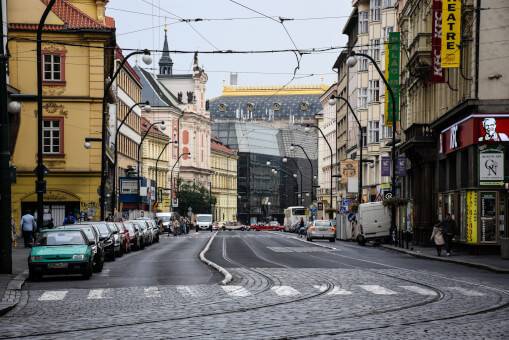Národní represents the very essence of Prague. After the window dressing of Wenceslas Square and Na Příkopě, Národní has no pretensions, no obvious purpose or audience, and it’s here that you begin to understand the real Prague, warts and all, unashamed and proud.
Národní is Prague.
Starting off in a very business-like manner, Národní seems grey and lacking character, its wideness and tight cobbles providing ample surface for the locals who start to encroach on the tourist numbers for the first time. To my left is Prague’s version of Tesco’s. Labelled ‘My’. I strolled in just to have a look around the three-storey department store and to my surprise stumbled across a particularly well-stocked music section. This was the first hint at the whole musical culture in Prague, and the reason behind the title of this series. Back home, you never saw a guitar for sale outside of a dedicated guitar shop, let alone a supermarket. But more than that, the quality of the instruments surpassed most guitar shops back home too. Not just guitars either, we had wind instruments, keyboards, you name it….. in Tesco’s !?
After the minor culture-shock, I headed over the road to U medvídků beer hall. (the letter U featured heavily in most pub names for some reason). As I confidently pushed through the door, I was met by groups of people, all sat around separate tables in deep conversation. It looked more like a brewery than a pub, all brass pipework, vessels and solid, natural wood. Again, the standard English procedure of propping up the bar didn’t really work here. I lingered for a moment but the staff were all tending to their seated customers. After an uncomfortable length of time, I received my (delicious) large pilsner and reluctantly took up a seat. If you can’t beat ’em, join ’em. Drinking seemed to be a very close-knit ‘family’ thing here, almost always involving food. There was none of the fast-paced pub-crawl culture of back home, more a relaxed, unhurried excuse to sit around a table and be sociable with family and friends. It’s such a shame it hasn’t caught on here.
Prague’s Rock Cafe was a real eye-opener. The last time I visited the place was way back in 2001, but for all intents and purposes, it was 1992 inside. Nirvana and grunge music were still in their heyday here, almost ten years behind the rest of the world. But the exuberance of the floppy-haired, lumberjack-shirted youth had even more vigour in these darkened, sweaty halls. The atmosphere was underground almost, safely hidden from authority. This was a release of the tensions I so far knew very little about.
For me, it was a chance to relive some of the best times of my life, like going back in a time machine, a beautiful feeling, but also with a slightly sour note that something was not quite right about the place, something sinister, oppressive even, as if one wrong move could mean the end in an instant. Looking past the paying customers, you could see the stark contrast in the battle-hardened, battle-scarred doormen. Stoically, menacingly watching, monitoring every move. Was there a reason we were ten years out of date? Has culture and media been controlled in some way? For now I just enjoyed the memories.
Unlike Wenceslas Square, Národní proudly displayed its ‘Dancing Bars’, tobacco and liquor stores for all the world to see. You get the feeling it doesn’t really care about the outside world’s opinion, and with the Tram-lines, layout and location, a sense that it may once have been Prague’s main high-street, but fallen out of favour because the face didn’t fit.
Towards the end of Národní, the view gets notably more official, regal even, with architecture rivalling Wenceslas square but somehow more authentic and definitely more understated. The billboards advertise a rogue’s gallery of the greatest classical musical virtuosos in the city, even the world, far in advance of my modest guitar skills. This was the pinnacle. Violin soloists stood out like gladiators with their Stradivarius’s, Jazz musicians with decades of experience between them, producing chords and scales I could only dream about. Even the solo guitarists took it up to another level, big names in the acoustic and flamenco arena, masters of their instrument, all under the same banner, the rubber-stamp of the Musical City.
And yet somehow the adverts seem more like watered down demonstrations, a toe in the water against the system that hopefully slips under the radar. There’s no razzmatazz which would bring the hammer down, no glimpses of personality or character, it’s all about the music, maybe it’s only allowed to be.
The tram terminus, grand government buildings and opera houses frame the first glimpses of the Vltava River, with, on the right corner, the splendidly high-class Cafe Slavia providing the icing on the cake. The road widens out to accommodate the patchwork of the intricate tram crossroads, which carries on over the bridge and beyond and opens out to the leafy but still dramatic riverside. Nothing seems forced. From end to end Národní holds your interest and wins your heart like an old man’s long-sleeve tattoo, etched with a lifetime’s worth of laughter, joy and pain.
Thinking back to the Taxi ride here, Národní had provided me with my first glimpse of the ‘soul’ of Prague and its people. Here, there was no filter, nothing to hide, even a slight tinge of defiance. I’d begun to notice its love for music and expression, even in the face of intolerance, and that feeling lured me in to explore deeper.

The astronomical clock!
Thanks for reading. I explore the old town next.
Interesting read Adam. Your descriptions are so vivid I really got a feel for the places you visited.